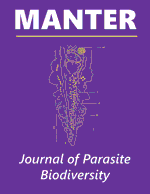Parasitology, Harold W. Manter Laboratory of

MANTER: Journal of Parasite Biodiversity
Date of this Version
10-27-2022
Document Type
Article
Citation
MANTER: Journal of Parasite Biodiversity (October 27, 2022) number 23
doi: 10.32873/unl.dc.manter23
Abstract
The COVID-19 pandemic is the latest example of the profound socioeconomic impact of the emerging infectious disease (EID) crisis. Current health security measures are based on a failed evolutionary paradigm that presumes EID is rare and cannot be predicted because emergence requires the prior evolution of novel genetic capacities for colonizing a new host. Consequently, crisis response through preparation for previously emerged diseases and palliation following outbreaks have been the only health security options, which have become unsustainably expensive and unsuccessful. The Stockholm paradigm (SP) is an alternative evolutionary framework that suggests host changes are the result of changing conditions that bring pathogens into contact with susceptible hosts, with novel genetic variants arising in the new host after infection. Host changes leading to EID can be predicted because preexisting capacities for colonizing new hosts are highly specific and phylogenetically conservative. This makes EID prevention through limiting exposure to susceptible hosts possible. The DAMA (Document, Assess, Monitor, Act) protocol is a policy extension of the SP that can both prevent and mitigate EID by enhancing traditional efforts through adding early warning signs and predicting transmission dynamics. Prevention, preparation, and palliation compose the 3P framework, a comprehensive plan for reducing the socioeconomic impact of EID.
This article has been produced in support of and with appreciation for the efforts by Gábor Földvári of the Institute of Evolution, Centre for Ecological Research, and the Centre for Eco-Epidemiology, National Laboratory for Health Security (both located at 1121 Budapest, Konkoly-Thege Miklós út 29-33, Hungary). Through his untiring efforts, team building, and leadership, he has secured the first EU-wide team research grant. This work was supported by the National Research, Development and Innovation Office in Hungary (RRF-2.3.1-21-2022-00006) and the COST Action CA21170 “Prevention, anticipation and mitigation of tick-borne disease risk applying the DAMA protocol (PRAGMATICK),” which represent the first funded efforts to apply the principles of the DAMA protocol.
Included in
Biodiversity Commons, Environmental Public Health Commons, International Public Health Commons, Parasitology Commons, Zoology Commons


Comments
Copyright © 2022, Molnár, Hoberg, Trivellone, Földvári, and Brooks
License: Creative Commons Attribution-NonCommercial-ShareAlike 4.0 International